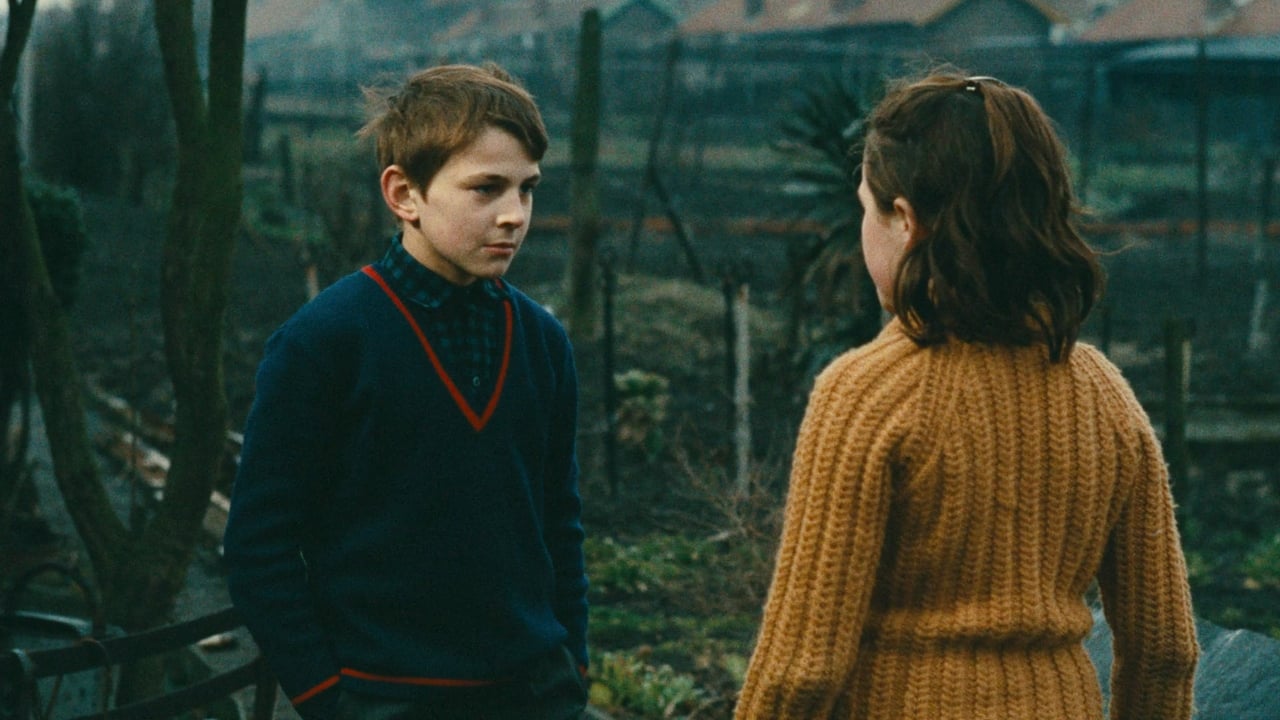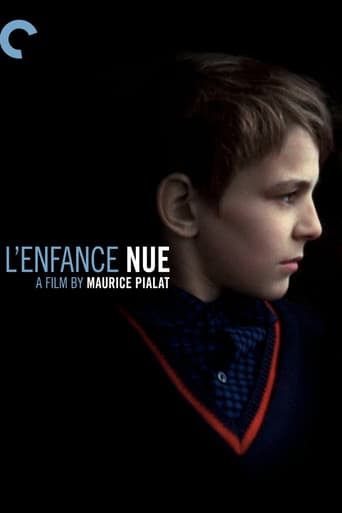Exoticalot
People are voting emotionally.
Tetrady
not as good as all the hype
Livestonth
I am only giving this movie a 1 for the great cast, though I can't imagine what any of them were thinking. This movie was horrible
Fatma Suarez
The movie's neither hopeful in contrived ways, nor hopeless in different contrived ways. Somehow it manages to be wonderful
Claudio Carvalho
The ten year-old boy François (Michel Terrazon) is left by his parents for adoption. His foster families become unhappy with his evil behavior, practicing small thefts, killing pets and provoking car accident and reject him. "L'enfance nue" is one of those well-made films that gives the sensation of a documentary to the viewer. In the late 60's, it was probably a realistic childhood docudrama to be discussed about orphaned children. Unfortunately the storyline is dated in 2017 and the troublemaker François is not as bad as he was in 1968. My vote is six.Title (Brazil): "Infância Nua" ("Naked Childhood")
Howard Schumann
François Fournier (Michel Terrazon) is a ten-year old boy dumped into the foster care system in France by his single mother, whom the film suggests was mentally ill. Maurice Pialat's first feature L'enfance nue is an unsentimental look at the foster care system in France and its effects on those in its care. Written by Maurice Pialat and Arlette Langmann and performed by non-professional actors with much of the dialogue unscripted, L'enfance nue comes from the director's own experience of being raised by his grandparents and the emotional distance he felt towards his biological mother and father. Though the film lacks peak dramatic moments and emotional payoffs, in its volatile main character; it captures the essence of humanity, in all of its contradictions.François personifies that ambivalence. He can be goodhearted and mean-spirited, cruel and kind, angry and loving, a cauldron of emotions that are sometimes hidden below the surface and sometimes acted out. Like most children, he is inarticulate and is at a loss to explain his actions, but the film does not seek any explanation. It just observes rather than judges. As the film opens, we see a protest march about economic conditions, but we soon learn that this is not a political statement, only a suggestion of the socio-economic area in which the film is set. François is living in the home of foster parents Simone (Linda Gutemberg) and Roby Joigny (Roual Billerey) who are unable to have their own children. We see him steal a watch, then flush it down the toilet, dropping his foster sister Josette's (Pierrette Deplanque) cat down a stairwell, refusing to eat, and peeing on the floor around his bed. Unable to cope, his foster parents deliver him back to Social Services but, again confounding our expectations, François lovingly buys a gift for his foster mother and seems genuinely sad about leaving. After a revealing scene at the adoption center where prospective parents size up the orphans in a way that reminded me of the slave auction in "12 Years a Slave," François is placed in the home of an older couple, the Thierry's (Marie-Louise and René Thierry, real-life foster parents) whom he calls Grandma and Grandpa. Also in the home are Raoul (Henri Puff), a teenage foster child, a younger girl, and Mrs. Thierry's elderly mother Nana (Marie Marc), who is mostly confined to bed. François responds to the tenderness shown by Nana who reads to him, sings songs with him, and talks about her life. They even discuss the meaning of the word "mistress." We think there is progress when he shows a sense of guilt for the first time after he steals Nana's coin purse and then quietly puts it back under her pillow. François is also drawn to Grandpa and spontaneously kisses him after he hears stories about the old man's activities with the French Resistance during World War II. Eventually, however, even the Thierry's begin to question his normality after he throws a knife at Raoul, deliberately spills soup on his brother's lap, smokes cigarettes and hangs out with his neighborhood toughs who together decide to throw iron bars at passing cars from an elevated bridge, an adventure that leads to serious consequences. With his very expressive eyes that seem to look right through you, Michel Terrazon is remarkable as the young man acting out his anger. Others are notable as well including Henri Puff's as young Raoul, but it is Terrazon's memorable performance that remains with us and haunts our dreams.
dbdumonteil
This is Maurice Pialat's debut movie and François Truffuat offered him to produce his first effort. Not only because he was at the time a seasoned filmmaker (a dozen of films so far for a man who was 36 years old whereas Pialat shot his first film when he was 42!) but because the topic could only please him. Indeed, Truffaut's first film, "les 400 coups" (1959) revolved around the same subject and was a big critical, commercial hit. However, Truffaut like the rest of the crew who worked with Pialat wasn't prepared to the director's unconventional shooting methods and consequently the two men will never talk to each other again for several years.Pialat used to say that he refused everything planned in the shooting of his films and "l'Enfance Nue" was inescapable to this scheme. Better, it was indispensable to have a genuine, deeply moving work as a result. Created in the chaos with tensions and having to rely on a shoestring budget, "l'Enfance Nue" is part of the top five films about stolen childhood alongside Julien Duvivier's "Poil De Carotte" (1932) and Luigi Commencini's "Incompreso" (1966). What "les 400 Coups" tried to reach, "l'Enfance Nue" achieved it. It's a much stronger flick than Truffaut's very overrated work. The piece of work from the former critic at the fusty "Cahiers Du Cinéma" suffered from a loose narration and cardboard characters which made it a bit humdrum to watch.Given the two other films Pialat gave us after his 1969 vintage: "Nous Ne Vieillirons Pas Ensemble" (1972) and "La Gueule Ouverte" (1974), these three films have often been perceived as a sort of trilogy of life and Pialat's treatment of stolen childhood is drastically different to Truffaut's. He opted for a nearly documentary approach and tried as best as he could to reproduce working class life as it was in the Northern France of the sixties. A method he will tap again with gusto for his next two films. And you can only marvel at Pialat's remarkable camera work and observation. The hero François is a cruel child, perhaps worse than Antoine Doinel who never threw a cat from the top of the stairs! He goes from household to household because his adoptive parents can't stand his cruelty. He's not the only one like that. At the beginning of the film, Pialat shows us numerous orphans in an orphanage who can't manage to find adoptive parents. But when François is put up by an elderly couple, he seems to have found human warmth and comfort from them. Feeling Pialat manages to convey to the audience in an astounding way. You must be tender towards the attention these little old people give to François like when Granny offers him a piece of cake after François was involved in a fight. And in a sequence close to "Cinéma Vérité", they talk about François with their own words and how much do they understand him! More than François's tragic story, Pialat's work encompasses a word picture of Northern France with its ways of life. His depiction is all the more genuine as he hired non professional actors who are in their own roles. During the shooting, Pialat used to write down excerpts of conversation these inhabitants had and to incorporate them in his film. This process of hiring "gifted amateurs" will be tapped again thirty years later for another film set in Northern France: Bruno Dumon's harrowing "la Vie De Jésus" (1997). Anyway, Pialat and Dumont understood well Robert Bresson's one of his cinematographic lessons: to hire non professional actors to reach the scale of purity. That's precisely what Pialat reached even if as a perfectionist he denied his film.A hard-hitting approach of naked childhood made without any embellishment. Pialat's debut film gains to be as famous and celebrated as Truffaut's so called masterpiece. And be prepared for a river of emotions!
zeid
* GUARANTEED SPOILER-FREE COMMENT *We're talking about real world cinema here, do don't expect any fantasy, ornament, or any other Hollywood recipe. But hey, how often do you get hit in the stomach by a movie ? I'll summarize the movie's endeavor by a question : "what's love to a child that has not been loved ?" I will add that in addition to flawless directing, we get fantastic amateur acting, plus a good document on (working class) France in the 60's (OK, not ALL of you out there are interested in that, but i must be honest, right ?).

